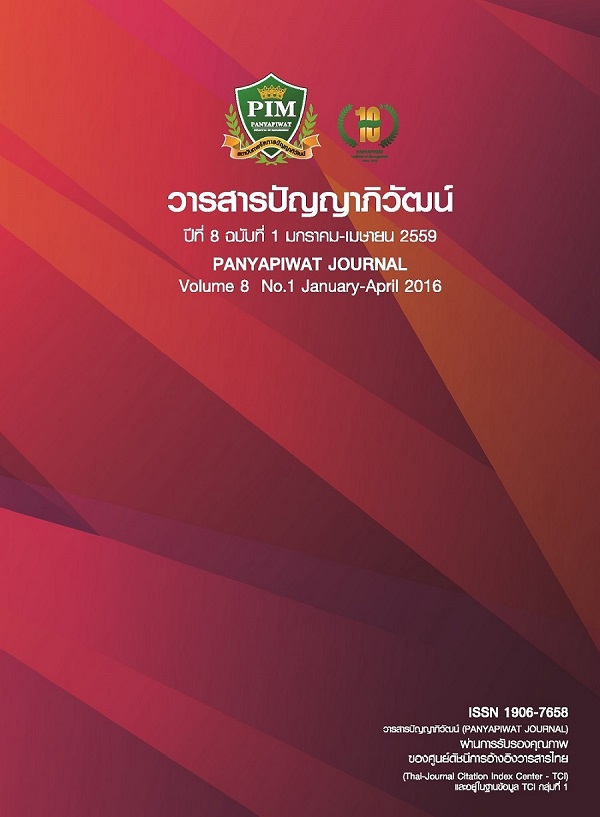KEY CULTURAL ELEMENTS INFLUENCING THE SOUTH KOREA’S NATION-BRAND PREFERENCE IN BANGKOK
Main Article Content
บทคัดย่อ
In the globalized world, ‘Nation Brand’ is increasingly important and ‘Nation branding’ concept is widely practiced as it provides great benefits to the nation. The South Korea is one of the nations which values nation brand and clearly exercises nation branding to gain great benefit from its nation-brand preference around the world including Thailand. This study is to learn from the success of the South Korea in Bangkok using quantitative research among 422 Bangkok consumers who prefer the South Korea’s nation brand with the objectives of understanding the influential demographic factors on the South Korea’s nation- brand preference, analyzing key cultural elements driving the South Korea’s nation-brand preference and its relationship to the purchase intent of South Korean products and services. This research study will be beneficial and serve as a guidance for the Thai government officials and private sector involving in the Thailand’s nation branding by suggesting the influential demographic factor of target consumer and key cultural elements that may influence nation-brand preference and purchase intent for Thailand’s nation branding exercise. Through the descriptive statistics as well as Pearson Chi-square test, the results clearly show that Gender and Education are the only influential demographic factors on the South Korea’s nation-brand preference. Though, all the cultural elements tested have influence on the South Korea’s nation-brand preference. By far, TV series are the most influential one driving the South Korea’s nation-brand preference consistently across all the respondents. Interestingly, the South Korea’s nation-brand preference leads to not only purchase intention of tourism but also the other South Korea’s products and services such as Korean restaurant dinning, cosmetics and mobile phone/tablet.
ในโลกที่มีความเป็นโลกาภิวัตน์นี้ แบรนด์ประเทศมีความสำคัญเพิ่มมากขึ้น และแนวคิดเรื่องการสร้าง แบรนด์ประเทศได้ถูกนำมาใช้กันอย่างแพร่หลายเพราะมีคุณประโยชน์ต่อประเทศอย่างอเนกอนันต์ ประเทศ เกาหลีใต้เป็นประเทศหนึ่งที่เห็นคุณค่าของแบรนด์ประเทศ ได้ไช้การสร้างแบรนด์ประเทศสร้างความชื่นชอบ ต่อประเทศและได้รับผลประโยชน์อย่างมากจากทั่วโลกรวมทั้งประเทศไทย การศึกษาเรื่ององค์ประกอบทาง วัฒนธรรมที่สำคัญอันมีผลต่อความชื่นชอบแบรนด์ประเทศเกาหลีใต้ในกรุงเทพมหานครนี้เป็นการเรียนรู้จาก ความสำเร็จของประเทศเกาหลีใต้โดยใช้การวิจัยเชิงปริมาณ (Quantitative Research) กับกลุ่มตัวอย่างผู้บริโภคในกรุงเทพฯ ที่มีความชื่นชอบประเทศเกาหลีใต้จำนวน 422 คน โดยมีจุดมุ่งหมายที่จะระบุคุณลักษณะของประชากร (demographic factor) ที่มีผลต่อความชื่นชอบแบรนด์ประเทศเกาหลีใต้และวิเคราะห์องค์ประกอบทางวัฒนธรรมที่ส่งผลต่อความชื่นชอบแบรนด์ประเทศตลอดจนความตั้งใจซื้อสินค้าและบริการของประเทศเกาหลีใต้ งานวิจัยนี้จะให้เแนวทางอันเป็นประโยชน์สำหรับตัวแทนภาครัฐและเอกชนที่เกี่ยวข้องกับการสร้างแบรนด์ประเทศไทย โดยให้คำแนะนำในเรื่องคุณลักษณะของประชากรที่มีผลต่อความชื่นชอบแบรนด์ประเทศ ตลอดจนองค์ประกอบทางวัฒนธรรมที่ส่งผลต่อความชื่นชอบแบรนด์ประเทศและความตั้งใจซื้อสินค้า และบริการของประเทศ ผลการวิจัยโดยใช้สถิติเชิงพรรณนาและการทดสอบไคสแควร์ พบว่า เพศและการศึกษา เท่านั้นที่มีผลต่อความชื่นชอบแบรนด์ประเทศเกาหลี ใต้ในกลุ่มตัวอย่างนี้ ทั้งนี้องค์ประกอบทางวัฒนธรรมทั้งหมดที่ทำการวิจัยต่างก็มีผลต่อ ความชื่นชอบ แบรนด์ประเทศ และความตั้งใจซื้อสินค้าและบริการของประเทศเกาหลีใต้โดยที่ทีวีซีรีส์เป็นองค์ประกอบทางวัฒนธรรมที่ส่งผลสูงสุดต่อความชื่นชอบแบรนด์ประเทศเกาหลีใต้ในทุกกลุ่มตัวอย่างที่ทำการวิจัยและเป็นที่น่าสนใจว่าความชื่นชอบแบรนด์ประเทศเกาหลีใต้ไม่เพียงนำไปสู่การซื้อและความตั้งใจซื้อสินค้าการท่องเที่ยวเท่านั้น แต่ยังนำไปสู่การซื้อและความตั้งใจซื้อสินค้าและบริการอื่นๆ ได้แก่ การรับประทานอาหารที่ร้านอาหารเกาหลี เครื่องสำอาง เกาหลี และแบรนด์โทรศัพท์มือถือและแท็บเล็ตของประเทศเกาหลีใต้อีกด้วย
Article Details
“ข้าพเจ้าและผู้เขียนร่วม (ถ้ามี) ขอรับรองว่า บทความที่เสนอมานี้ยังไม่เคยได้รับการตีพิมพ์และไม่ได้อยู่ระหว่างกระบวนการพิจารณาลงตีพิมพ์ในวารสารหรือแหล่งเผยแพร่อื่นใด ข้าพเจ้าและผู้เขียนร่วมยอมรับหลักเกณฑ์การพิจารณาต้นฉบับ ทั้งยินยอมให้กองบรรณาธิการมีสิทธิ์พิจารณาและตรวจแก้ต้นฉบับได้ตามที่เห็นสมควร พร้อมนี้ขอมอบลิขสิทธิ์บทความที่ได้รับการตีพิมพ์ให้แก่สถาบันการจัดการปัญญาภิวัฒน์หากมีการฟ้องร้องเรื่องการละเมิดลิขสิทธิ์เกี่ยวกับภาพ กราฟ ข้อความส่วนใดส่วนหนึ่งและ/หรือข้อคิดเห็นที่ปรากฏในบทความข้าพเจ้าและผู้เขียนร่วมยินยอมรับผิดชอบแต่เพียงฝ่ายเดียว”
เอกสารอ้างอิง
Anholt, S. (2007). Competitive Identity: The New Brand Management For Nations, Cities and Regions. Palgrave Macmillan (USA).
Boone, H. N. & Boone, D. A. (2012). Analyzing Likert Data. Retrieved November 2, 2014, from http://www.joe.org/joe/2012april/tt2.php
Dinnie, K. (2008). Nation Branding Concepts, Issues, Practice. UK: Elsevier Ltd.
Dinnie, K. (2009). Leveraging Nation Brand Equity-Potential Strategies For Trinidad And Tobago.Retrieved March 26, 2014, from http://www.brandhorizons.com/ papers/Dinnie_Trinidad_ TobagoNB.pdf
Fan, Y. (2008). Soft Power: Power Of Attraction Or Confusion?. Place Branding and Public Diplomacy, 4(2), 147-158.
Israel, G. D. (1992). Determining Sample Size. Retrieved May 23, 2014, from http://www.sut.ac.th/im/data/read6.pdf
Kim, R. (2011). Searchers And Planners: South Korea’s Two Approaches To Nation Branding.Retrieved April 12, 2014, from http://uskoreainstitute.org/wp-content/uploads/2011/05/RKim_YB2010.pdf
Korea (2013). Korean Cultural Center quenches Thailand’s thirst for Hallyu. Retrieved April 25, 2014, from http://www.korea.net/NewsFocus/Culture/view?articleId=109844
Lavidge, R. J. & Steiner, G. A. (1961). Hierarchy Of Effects Model. Retrieved May 12, 2014, from http://www.learnmarketing.net/hierarchy_of_effects_model.html
Lee, D. H., Kim, K. R. & Yang, S. J. (2013). The 2012 survey result of the SERI–PCNB model.SERI Issue Paper. Seoul: Samsung Economic Research Institute.
McNeal, J. U. (1982). Consumer Behavior: An Integrative Approach. MA: Little, Brown and Company.
National Statistical Office. (2013). Statistical Year Book-Thailand 2013. Retrieved June 2, 2014 from http://web.nso.go.th/en/pub/e_book/YEARBOOK_2013/index.html#/61/zoomed
Olins, W. (2002). Branding the Nation-The Historical Context. Journal of Brand Management, 9(4/5), 241-248.
Sääksjärvia, M. & Samiee, S. (2011). Relationships among Brand Identity, Brand Image and Brand Preference: Differences between Cyber and Extension Retail Brands over Time. Retrieved April 15, 2014, from htps://www.academia.edu/710162/Relationships_among_Brand_Identity_Brand_Image_and_Brand_Preference_Differences_between_Cyber_and_Extension_Retail_Brands_over_Time
Saleepoch, N. (2009). The Effect of Korean Wave on Trade between Thailand and South Korea. Retrieved May 10, 2014, from http://cuir.car.chula.ac.th/handle/123456789/20085Saxena, V. (2013). Country Branding: Why It Is Not Just An Advertising Campaign. Business & Technology Report, 5(2), 16-18, 24.
Wonkboonma, C. (2009). Consumer behavior and factor as influenced by Korean entertainment media of teenager in Mueang District, Chiangmai Province. Retrieved May 20, 2014 from http://library.cmu.ac.th/faculty/econ/Exer751409/2552/Exer2552_no2


